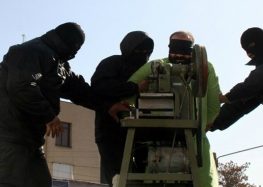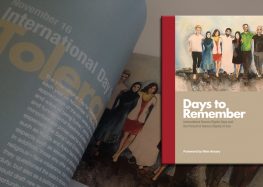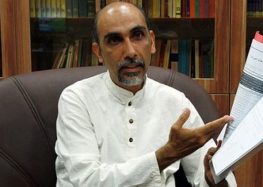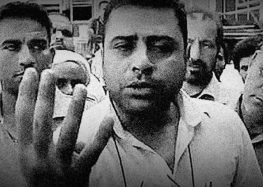Tehran Prosecutor’s Illegal Actions Against Political Prisoners Should be Stopped
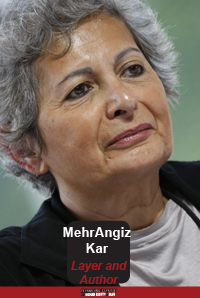 Legal Analysis By Mehrangiz Kar
Legal Analysis By Mehrangiz Kar
Tehran Prosecutor Abbas Jafari Dolatabadi, has turned the absolute legal rights of Iranian political prisoners, imprisoned journalists, and prisoners of conscience into special privileges that can only be granted a prisoner upon Mr. Dolatabadi’s decision. In order to use these absolute and legal rights, families of political prisoners have to pursue them vigorously and to pass many administrative and bureaucratic hurdles in order to secure the Prosecutor’s permission. This is because Mr. Prosecutor has sacrificed the prisoners’ rights in favor of his partisan interpretations of the laws.
For example, journalist Bahman Ahmadi Amouee, a prisoner of conscience currently at Evin Prison, has not been granted an in-person visit with his family during the past year. The Prosecutor has not agreed to his in-person visit with his family, and he has only been able to visit with them through a booth. Regular prisoners such as drug traffickers are routinely granted in-person visits, while Bahman Amouee has been deprived of them. The law has not stipulated any exceptions to this right for political prisoners, journalists, or prisoners of conscience.
Written requests to the Prosecutor for permission to have in-person visits, a procedure unspecified by the law, is one of the procedures currently in place that have created a long backlog, addressed on a per-case basis by the Prosecutor, where he applies his personal taste and preference in the process. Over the past year, the Prosecutor’s personal taste and preference has not been in favor of Bahman Ahmadi Amouee’s case, according to his family. Amouee remains in a difficult situation inside prison where he is deprived of his most basic rights, including permission to make phone calls.
Families of political prisoners have repeatedly stated that the long administrative processes for applying for furlough leave and for in-person visitation is wearing to them. They have further indicated that they find the lack of procedures and standards for receiving the Prosecutor’s permission (a step that is not stipulated as a requirement in the Operations Procedures Manual of the Iranian Prisons Organization), as a clear lack of regard for existing laws. For example, according to Article 182 of the Operations Procedures of the Iranian Prisons Organization, the husband, wife, father, mother, brother, sister, and children of a convict or suspect, as well as parents of his/her spouse are entitled to meet with the convict according to conditions defined for weekly visitations. Other relatives and friends of the convict may request and receive permission for visits from the head of the correctional facility or prison or the Supervising Judge.
According to Article 183 of the same Procedures Manual, “convicts who demonstrate good behavior, upon approval from the head of the facility or the Supervising Judge, can have in-person visits with their wife, children, parents, brothers, sisters, or parents of their spouse in the presence of a supervising officer.”
According to Article 185 of the same Pocedures Manual, “upon agreement by the head of the facility or prison, or the Supervising Judge, in some cases, suspects or convicts may have private visits with their spouse or children without the presence of a supervising officer.”
According to Article 188 of the same Procedures manual, “the weekly general visitation schedule, reflecting days and hours appropriate for each season and the needs of each location, should be prepared by the head of the facility or prison and once approved by the General Manager, the schedule will be advertised. Note 1: The visitation schedule should be organized in a way that male and female visitors are able to visit the inmates separately. Note 2: The public visitation schedule should be organized in a way that each inmate has at least one visitation per week, not to last under 20 minutes.”
According to Article 190 of the said Procedures Manual, “Under guidance from a physician, the Head Warden can facilitate visitations with sick inmates who are hospitalized and unable to move.”
Bahman Ahmadi Amouee has been sentenced to five years in prison for his journalistic activities and his articles criticizing the government’s economic performance. He has been deprived from the right to have furlough leave for the past 16 months. He is joined by dozens of other political prisoners in this deprivation. Chapter 3 of the Procedures Manual that oversees the operations of prisons is devoted to the rights of convicts to furlough, for which Bahman Ahmadi Amouee is eligible. Legal circles demand the release of all political prisoners such as Bahman Ahmadi Amouee who have been arrested, detained, tried, and sentenced unfairly and illegally. Prior to his deserved release, adherence to rights extended to him through the Prison Operations Procedures Manual could limit his and his family’s angst.
In all of the other articles and notes of the Prison Operations Procedures Manual, the need for the Prosecutor’s interference is not foreseen; however, family members of political prisoners report of days and weeks of bureaucratic run around in order that they may obtain approval from the Prosecutor for their in-person or even booth visits with their prisoner relatives. The direct interference of Tehran Prosecutor in such rights, his disregard for the rights of political prisoners, imprisoned journalists, and prisoners of conscience, and his treatment of these rights as privileges dispensed by him and based on his personal preferences, have all taken place to the detriment of the law. The Prosecutor’s actions are illegal and are grounds for legal action. This option remains open to families of political prisoners.


